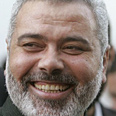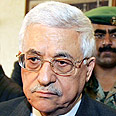

Hamas on Saturday rejected demands by PLO leaders that its government resign over the failure to form a moderate coalition acceptable to the West — a sign of an intensifying power struggle between Islamic militants and moderate President Mahmoud Abbas.
The crisis was accompanied by angry exchanges between Hamas and leaders of Abbas' Fatah Party.
Hamas accused Fatah, which controls the Palestine Liberation Organization and was defeated in parliament elections a year ago, of trying to overthrow the government. A leading Fatah official called for early elections to resolve the standoff.
The showdown began Thursday when Abbas announced the failure of months of negotiations with Hamas over setting up a moderate government that could win international recognition and help end a foreign aid boycott.
Talks deadlocked over the distribution of key portfolios and the government's platform, with Hamas rejecting international demands that it renounce violence and recognize Israel.
PLO: Haniyeh must resign
On Friday, Abbas convened the PLO's top decision-making body, the Executive Committee. The panel called on Prime Minister Ismail Haniyeh of Hamas to resign, to make way for the appointment of a new prime minister who could then resume negotiations with Abbas.
Hamas rejected the demand. "This is a coup," Hamas spokesman Fawzi Barhoum said Saturday. "We cannot accept such a step, which is against Palestinian democracy and goes against the election results. The PLO doesn't represent the Palestinian people."
Haniyeh, who left last week for a tour of the Arab world, has told Abbas in the past he would only step down once agreement has been reached on a new government.
Hamas officials called on Abbas to resume the negotiations.
However, Abbas told PLO leaders Friday that he would not return to the talks, said one of the participants, Saleh Raafat of the PLO's small Fidda Party.
Limited options
In the meeting, Abbas appointed a six-member subcommittee that is to present a list of options to him on Monday. Abbas also plans to deliver an address to the Palestinian people to explain what led to the crisis, committee members said.
Abbas' choices are limited. He has the authority to fire the Hamas government, but a new Cabinet he appoints in its place would be denied approval by the Hamas-dominated parliament.
The Palestinians' Basic Law, a forerunner to a constitution, does not allow him to call early elections. However, he could hold a referendum on whether such elections should be held, his aides have said.
Two members of the panel asked by Abbas to come up with options said they prefer early elections, both for president and parliament.
"We are completely paralyzed. This (Palestinian) authority is paralyzed. Let us go to our people, and tell them the truth, and let them decide what they want," said Azzam al-Ahmed, leader of the Fatah bloc in parliament.
Abbas was elected president for a four-year term in 2005, and Hamas trounced Fatah in separate parliament elections a year later. Fatah has not recovered from the defeat and remains in disarray.
Al-Ahmed said the emerging consensus in the subcommittee is to recommend early elections. "This choice, the early election, will be much better than the current situation, even if Fatah lost both the presidential and parliament elections."
Raafat, also a committee member, agreed. "The most acceptable choice is early elections," he said.















